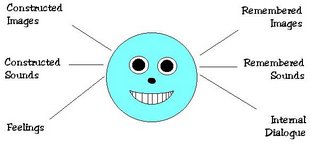NLP - Neuro Linguistic Processing
Might be straying a little of track here but I happened to have a conversation with my director yesterday regarding communication skills and how effective they are regardless of the context. He went on to mention NLP which he had found quite interesting, having heard the name before but not knowing too much about it I decided to further investigate....
NLP: Useful model of beliefs and techniques that offer a way to use the mind and body to achieve excellence in learning, business, counseling, relationships, sports and other experiences of life.
"The initial ideas of NLP were developed around 1973 by Richard Bandler, a student, and John Grinder, a professor of linguistics, in association with the social scientist Gregory Bateson. The term "Neuro-linguistic programming" denotes a set of models and principles meant to explore how mind and neurology (neuro), language patterns (linguistic), and the organization of human perception and cognition into systemic patterns (programming) interact to create subjective reality and human behaviors."
One article purports "NLP looks for patterns and one of the earliest patterns noticed in humans was a tendency for the eyes to look in a certain direction when thinking in a certain way."

One examples goes:
If you are trying to convince your teenager to clean his room and every time he
refers to his lack of interest in the subject, he looks up and to his right, he's probably constructing an image,
possibly an unpleasant image of himself cleaning his room.
If you continue telling him how nice it would feel to have the room clean,
you're not likely to get far.
You're trying to appeal to how it feels to have a solution when all he's seeing is a problem.
You're not speaking the same language representationally.
If you were to recognize this difference and tell him how nice his room would look with everything appearing neat you would have a better chance of getting some action out of him.
So essentially,
Recognizing whether someone is seeing, hearing or feeling, allows you to match the sensory system they're using and communicate with them much more easily.
NLP: Useful model of beliefs and techniques that offer a way to use the mind and body to achieve excellence in learning, business, counseling, relationships, sports and other experiences of life.
"The initial ideas of NLP were developed around 1973 by Richard Bandler, a student, and John Grinder, a professor of linguistics, in association with the social scientist Gregory Bateson. The term "Neuro-linguistic programming" denotes a set of models and principles meant to explore how mind and neurology (neuro), language patterns (linguistic), and the organization of human perception and cognition into systemic patterns (programming) interact to create subjective reality and human behaviors."
One article purports "NLP looks for patterns and one of the earliest patterns noticed in humans was a tendency for the eyes to look in a certain direction when thinking in a certain way."

One examples goes:
If you are trying to convince your teenager to clean his room and every time he
refers to his lack of interest in the subject, he looks up and to his right, he's probably constructing an image,
possibly an unpleasant image of himself cleaning his room.
If you continue telling him how nice it would feel to have the room clean,
you're not likely to get far.
You're trying to appeal to how it feels to have a solution when all he's seeing is a problem.
You're not speaking the same language representationally.
If you were to recognize this difference and tell him how nice his room would look with everything appearing neat you would have a better chance of getting some action out of him.
So essentially,
Recognizing whether someone is seeing, hearing or feeling, allows you to match the sensory system they're using and communicate with them much more easily.

0 Comments:
Post a Comment
<< Home